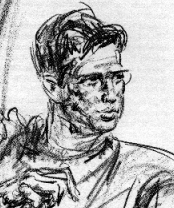
Paul Meadlo was a young farm boy whose life was drastically changed because he failed to question orders. Meadlo admitted to shooting his rifle into groups of people, including the group of people in a ditch, when ordered to so by William Calley. While he did so he was crying hysterically and pleading with others who were not firing to join in. When asked why he followed an order to kill women and children, Meadlo stated that he believed he could be shot if he disobeyed an order, and that in the past Calley had kicked him when he failed to follow orders.
Two days after the incident at My Lai, the Charlie Company broke camp early and began moving south. A sergeant had ordered the group to stop on the side of a hill, but Calley ordered the men to continue up the hill (although strategically there was nothing to be gained). Calley and Meadlo, the mine sweeper, continued on up the hill. No one else followed. When Calley turned back and noticed the other men had remained in place, he went back down to the men and told Meadlo to follow, but to “not bother” sweeping for mines as it would take too much time. This was some of the worst advise Meadlo ever followed. During his retreat, Meadlo stepped slightly off the trail and a land mine exploded, blowing off his foot. Calley’s face was cut by a piece of flying shrapnel. It took twenty minutes for a helicopter to be flown in, and Meadlo had to be given shots of morphine for the pain in the mean time. As he was flown off, he cursed Calley shouting, “You’ll get yours! God will punish you Calley!” While recovering in the hospital, Meadlo firmly believed that God was punishing him for his conduct. He received the Purple Heart for his injury (as did Calley for his cut incurred in the same explosion).
When Meadlo returned home after the war to his wife and year old son, he was a “nervous stuttering wreck.” He took a factory job to support his family, despite the searing pains in his leg. His mother claimed that she “ had sent the Army a nice boy before he went to Vietnam, and they had turned him into a murderer,” and that, “he wasn’t raised up like that.” Meadlo had kept the My Lai incident a secret from his family, although his conscience bothered him a great deal. When he was approached by the Wilson investigation, he was eager to tell his story. The eagerness was due in part to his anger at having his disability pension reduced from $197 to $136 a month once his stump of a foot healed and he was fitted with an artificial limb. When told that what he said could be used against him in court, he replied, “I don’t care,” and proceeded to tell what had happened that morning in 1968 in My Lai.
As the Calley trial was in progress, Meadlo agreed to do an interview on CBS with Mike Wallace. Meadlo’s story forced American’s to recognize that something terrible had taken place in Vietnam. Although Meadlo received no compensation for his CBS interview (except travel expenses), afterwards he refused to do other interviews without being paid.
Even though he had admitted his role at My Lai on national television, Meadlo initially refused to testify at Calley’s trial on the advice of his lawyer. He changed his mind when he was given a grant of immunity. When Meadlo arrived at the court room “his whole manner [was] emotionless, almost dead, and his voice, for the most part, equally lifeless.” As he testified, two federal marshalls sat close by ready to take him to jail if he refused to answer any questions. Meadlo testified that he never considered whether an order was legal or illegal, he just followed them. Since he was a wounded veteran, Latimer was rather gentle in his cross examination, although Meadlo had given testimony as damaging as that of any other witness. Meadlo also testified that Medina had been at the ditch, which other witnesses had denied. After his testimony, Meadlo limped out of the court room looking like a “sad, pathetic figure.”
